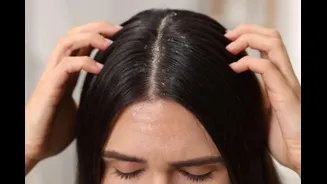Winter can be harsh on your skin and your scalp is no exception. As temperatures drop and humidity levels fall, the scalp’s natural oil balance gets disrupted. “When we take frequent hot showers or sit
in heated indoor environments, the scalp skin dries out significantly,” explains Dr Pravin Banodkar, MBBS, DNB, DD (UK), FIDP Dermatology, Co-Founder & Lead Dermatologist, Skin Beyond Borders.
This dryness, combined with low moisture in the air, often leads to flakiness, irritation, and dandruff. “In the cold air, the scalp loses hydration, and to compensate, it starts overproducing oil,” says Dr Banodkar. “This imbalance creates an ideal environment for Malassezia yeast, a natural fungus on the scalp to multiply, worsening dandruff and flakes.”
How to Manage Your Scalp in Winter
So, how do you care for your scalp during the cold months? Dr Banodkar recommends starting with an anti-dandruff shampoo. “Look for ingredients like zinc pyrithione,” he advises. “These shampoos help reduce the fungal population on the scalp and bring balance back.”
Use the shampoo once or twice a week, and let it sit for 2–5 minutes before rinsing. For added nourishment, gently oil the scalp. “Use light oils such as coconut oil and massage it once or twice a week before shampooing,” suggests Dr Banodkar. “However, if dandruff is active, avoid leaving the oil overnight, as that can worsen fungal growth.”
Moisturise, Don’t Overheat
Moisturising the scalp is just as important as cleansing. Serums with niacinamide and aloe vera can help soothe dryness and reduce inflammation. “Avoid using very hot water to wash your hair,” cautions Dr Banodkar. “Opt for lukewarm water instead, because excessively hot water strips the scalp of its natural oils, worsening flakiness.”
He also recommends using a humidifier indoors to maintain healthy moisture levels in the air. “This simple step can make a big difference in reducing winter scalp dryness,” he notes.
Feed Your Scalp from Within
A healthy scalp also depends on internal nutrition. “Include oral antioxidants, omega fatty acids, vitamin E, and probiotics in your diet,” says Dr Banodkar. “They help reduce inflammation and improve overall scalp health.”
Staying hydrated is equally essential. “Drink plenty of water, dehydration can make dandruff worse,” he adds.
When to See a Dermatologist
Sometimes, flakes can be more than just dandruff. “If you notice very thick, yellow scales, severe itching, or bleeding when you scratch your scalp, consult a dermatologist immediately,” warns Dr Banodkar. “It could be seborrheic dermatitis or another scalp condition that needs medical care.”
He also reminds readers to maintain good hygiene during winter. “Regularly wash your caps, scarves, and hoodies, they can harbor fungi or bacteria that aggravate scalp issues,” he explains.
The Takeaway
“Regular scalp moisturising helps a lot,” says Dr Pravin Banodkar. “Following simple, consistent care like oiling with coconut oil twice a week and maintaining hydration can make all the difference.”
After all, a healthy scalp is the foundation of healthy hair. With mindful care, the right products, and a few dermatologist-approved habits, your scalp can stay flake-free and balanced all winter long.












